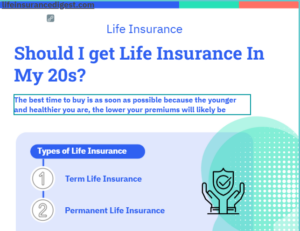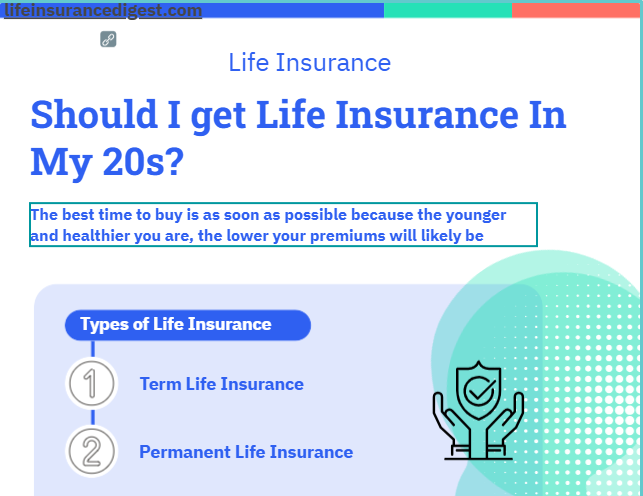Are you a parent or a teenager sitting somewhere probably wondering if getting Life Insurance in your 20s is worth it? Well, worry not as you will get the best help here.
Getting life insurance in your 20s can be a smart move, especially if you have loved ones depending on you, want to leave behind a legacy, or have debts to cover.
Both term and permanent policies are more affordable when you’re younger compared to later in life. However, not everyone in their 20s and 30s needs life insurance right away.
Typically, the best time to buy is as soon as possible because the younger and healthier you are, the lower your premiums will likely be.
Term life insurance provides coverage for a specific period, like 20 or 30 years. Once the term ends, the policy expires unless you renew it or convert it to a more expensive permanent or whole life policy.

Why you should have a Life Insurance When Still Young
One of the main reasons to consider buying life insurance is to ensure financial protection in case of a major accident or unexpected event.
For instance, if you have significant debts like student loans or a mortgage, life insurance can prevent passing on those financial burdens to your loved ones.
Additionally, if you have a spouse or children who rely on your income, life insurance can provide them with the support they need to maintain their livelihoods if something were to happen to you.
Moreover, life insurance offers more than just a death benefit. Some policies also provide payouts if you experience serious medical issues like cancer or paralysis during your lifetime.
Permanent life insurance policies can even function as tax-advantaged savings tools, allowing you to build up cash value over time while still benefiting from insurance protection.
This cash value component offers you an opportunity to grow your savings alongside the security provided by the insurance policy.
Life Insurance at 20s InfographicTypes of Life Insurance one Can Adopt
Term Life Insurance
Term Life Insurance offers coverage for a specific period and a defined set of potential events.
For instance, you might opt for a level-premium term policy providing $400,000 coverage over 20 years at $40 per month.
This coverage ensures that if the insured passes away, the named beneficiary receives the $400,000 benefit.
This type of policy could be valuable for a 25-year-old to cover final expenses and debts, preparing for future needs like family and mortgage payments.
Some term policies even offer a return of premiums if the insured survives the term, although these tend to be pricier.
“Return of Premium Life Insurance” is one such option, albeit more expensive than level-term policies.
Additionally, decreasing term insurance is beneficial for addressing specific financial liabilities, such as mortgages, as the policy’s face value decreases over time in line with the shrinking liability.
Even individuals in their 20s may have insurable liabilities, making decreasing term policies a viable choice.
Permanent Life Insurance
Permanent life insurance provides a death benefit that doesn’t expire, ensuring your heirs receive the payment whenever you pass away, as long as you keep up with the premiums.
However, it’s crucial to consider the higher cost of premiums, often amounting to hundreds of dollars per month.
These policies also offer an opportunity to accumulate savings through a cash value account, which is particularly advantageous for individuals in their 20s, given the ample time available to build up savings.
Various types of permanent life insurance exist, including whole life, universal life (UL), variable life, and indexed universal life (IUL).
These options differ mainly in how aggressively the policy’s cash value grows.
Final Thoughts
Getting life insurance in your 20s can be a smart move, particularly because you can secure coverage at very affordable rates.
Both term and permanent policies are more budget-friendly when you’re younger compared to later in life.
Even if you don’t feel an immediate need for life insurance, purchasing a policy now can set you up for future insurance needs.
It’s a good idea to chat with an insurance broker who can help you compare various policy options and determine what role, if any, life insurance should play at this stage of your life.
Find Related Articles!
